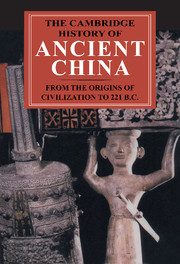Book contents
- Frontmatter
- Introduction
- 1 China on the Eve of the Historical Period
- 2 Language and Writing
- 3 Shang Archaeology
- 4 The Shang: China’s First Historical Dynasty
- 5 Western Zhou History
- 6 Western Zhou Archaeology
- 7 The Waning of the Bronze Age: Material Culture and Social Developments, 770–481 B.C.
- 8 The Spring and Autumn Period
- 9 Warring States Political History
- 10 The Art and Architecture of the Warring States Period
- 11 The Classical Philosophical Writings
- 12 Warring States Natural Philosophy and Occult Thought
- 13 The Northern Frontier in Pre–Imperial China
- 14 The Heritage Left to the Empires
- Bibliography
- Index
- Map 1 Topography of China
- Map 3.1 Archaeological sites of the Early Bronze Age
- Map 6.1 Archaeological sites of the Western Zhou period
- References
11 - The Classical Philosophical Writings
Published online by Cambridge University Press: 28 March 2008
- Frontmatter
- Introduction
- 1 China on the Eve of the Historical Period
- 2 Language and Writing
- 3 Shang Archaeology
- 4 The Shang: China’s First Historical Dynasty
- 5 Western Zhou History
- 6 Western Zhou Archaeology
- 7 The Waning of the Bronze Age: Material Culture and Social Developments, 770–481 B.C.
- 8 The Spring and Autumn Period
- 9 Warring States Political History
- 10 The Art and Architecture of the Warring States Period
- 11 The Classical Philosophical Writings
- 12 Warring States Natural Philosophy and Occult Thought
- 13 The Northern Frontier in Pre–Imperial China
- 14 The Heritage Left to the Empires
- Bibliography
- Index
- Map 1 Topography of China
- Map 3.1 Archaeological sites of the Early Bronze Age
- Map 6.1 Archaeological sites of the Western Zhou period
- References
Summary
- Type
- Chapter
- Information
- The Cambridge History of Ancient ChinaFrom the Origins of Civilization to 221 BC, pp. 745 - 812Publisher: Cambridge University PressPrint publication year: 1999
References
- 16
- Cited by



